Aliir Aliir: We need to talk about racism
Forced to flee war in South Sudan, Aliir Aliir encountered a new battle in Australia. How to fit into a totally alien culture where, for many African arrivals, racism is part of everyday life.
SA Weekend
Don't miss out on the headlines from SA Weekend. Followed categories will be added to My News.
Eradicating racism starts by first acknowledging it exists, then talking about it, Port Adelaide champion defender Aliir Aliir says.
He refers to it as “shining a light’’ on racism, to bring it out of the shadows.
Aliir is a well-known, successful AFL player. He’s played 106 games for Port and Sydney after making his debut for the Swans in 2016. He was selected in the 2021 All Australian team. His athletic, daring style has made him a favourite of footy fans around the country.
He’s also African. He came to Australia when he was only eight, arriving from a refugee camp in Kenya, a place his family had fled to escape civil war in their home country Sudan.
And he still feels the weight of racism in everyday life.
“We do cop it, you walk to the shops, you walk anywhere, you get a weird look, (people) thinking is he going to steal? Is he going to start a fight? Is he going to do something?’’ Aliir says.
The 28 year old has experienced racism even at the high points of his football career. After winning the medal as best afield in a 2021 Port v Crows game, he was racially vilified on Twitter.
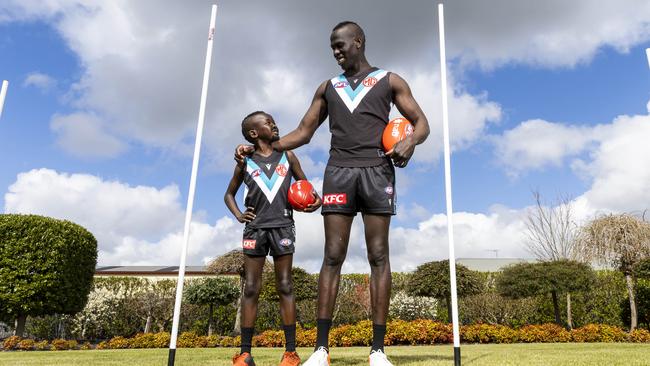
Aliir believes there has been an unfair focus on the behaviour of a small group of young Africans. Certainly some politicians have jumped on that bandwagon. Liberal leader Peter Dutton once claimed Victorians were scared to go out to restaurants because of “African gang violence”.
In Adelaide, SA Police launched Operation Meld to crackdown on youth gang violence, which had led to a spate of stabbings and a murder in the CBD.
Aliir believes it’s only a small proportion of what is still a small community that causes problems. But it creates a backlash.
“And it’s like, deport them, get rid of all Africans, they’re all bad, they all want to be part of a gang. They are all this and that. Well, that’s not the case,” he says.
Aliir says this takes away from the positive, success stories of many African migrants in Australia. Including himself.
“It’s unfair on the guys that are doing so well, because there’s a lot of people that have worked their arse off to get to where they are,” he says.
“Whether they’re lawyers, professional athletes, doctors, they’ve had to work their arse off to get there. I think the more of us that can come out and I guess, speak about the guys that are doing well, I think it’ll definitely go a long way because we need to be able to be the voice for the people that don’t really have voices.”
Part of the solution, Aliir says, is for those who have done well to share their experiences. Not just to tell the story of their success but to also tell their stories of racism. To not shy away from it. To share those stories with their white friends.
“Words can actually hurt people and my message is just to keep shining a light on it. Talk about it. And share it,” he says.
“Australians that are your friends, share your story with them. The experience you have had with racism, whether you have been called a certain thing, let them know because if they are your friends and they are there for you, I’m sure they’ll share that with their other white friends. And then it’s just a domino effect.”
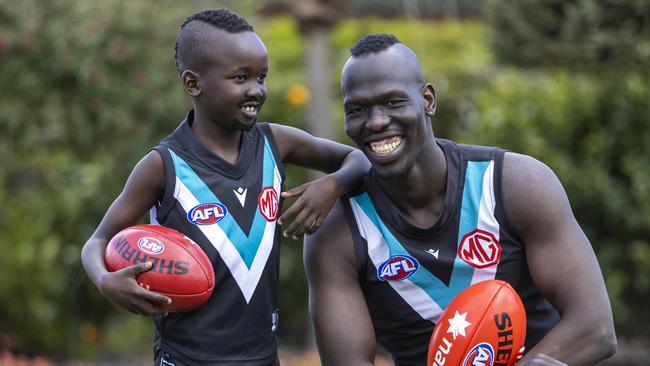
Aliir says he used to resist being labelled a role model, but now embraces the idea. He likes the idea of encouraging more young kids into the game.
“I think in the early days I’ve never really seen myself as a role model,” he says. “But I think the longer that I’m in the league and in the system, the more of a role that I can play in helping, particularly the multicultural kids that are coming from different background.
“When people come up and say I look up to you, I love what you do, it makes me want to do right by a lot of people.’’
Aliir is now also a star turn in the popular NAB Mini Legends ad series. In the ads, young kids are dressed up as their footy heroes. Plenty of the biggest names in the game have been chosen in past versions, including Sydney great Lance Franklin and former Geelong champion Gary Ablett Jr.
The Aliir version has eight-year-old Timothy Kuol dressed up in Port gear and wearing his familiar mohawk haircut. Timothy also shares Aliir’s cultural background.
“Aliir Aliir is from South Sudan same as me, my parents are from the same tribe, Dinka,” Timothy says. “I am a Port Adelaide supporter simply because of Aliir Aliir.”
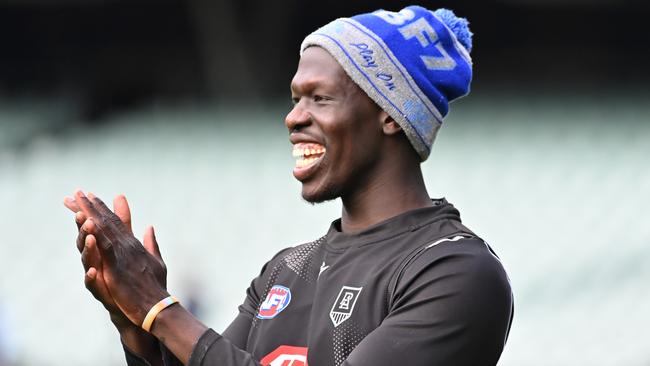
Aliir says it’s a little hard to describe how it feels to have his own Mini Legend.
“I don’t know how to put it really into words or describe it, but it’s a great feeling to have a little Mini Legend,” he says.
There has been a bit of banter with friends who reckon this shows he has made the big time. “A few of my mates back in Perth are making fun of me saying ‘don’t worry about all the other stuff, now you’ve got a Mini Legend’.”
His mum is definitely pleased. “She couldn’t believe how much he actually looks like me,” he says with a laugh.
Aliir was a late bloomer in footy terms, not picking up the game until he was in his mid-teens. In the Kakuma refugee camp in northwestern Kenya, soccer had been the game of choice, even if the ball was just a balloon wrapped in clothes.
“There was a lot of stuff that was going on, war stuff,” he says. But he was just a kid. He was aware of the war but his days in the camp were “just playing sport and being around family, that’s what I did”.
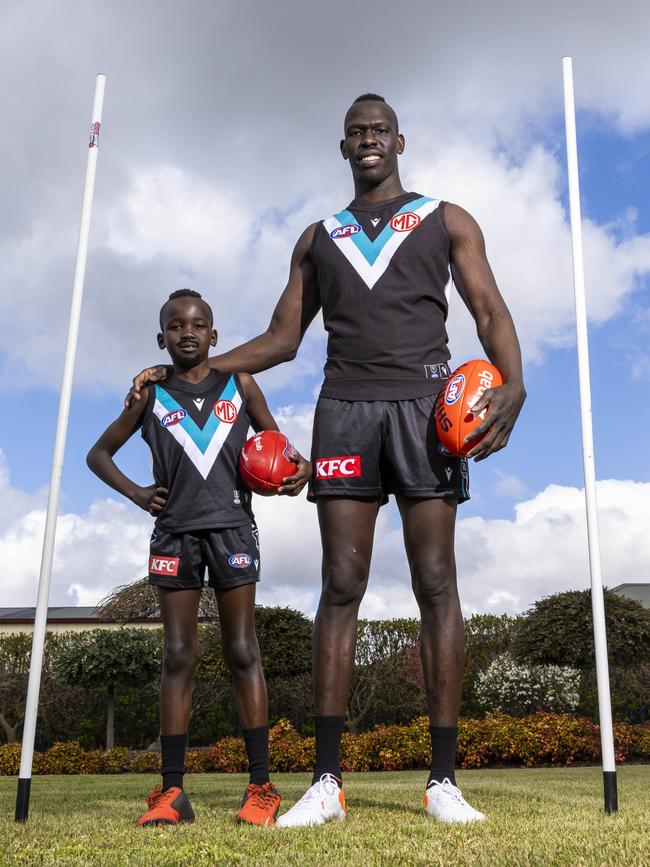
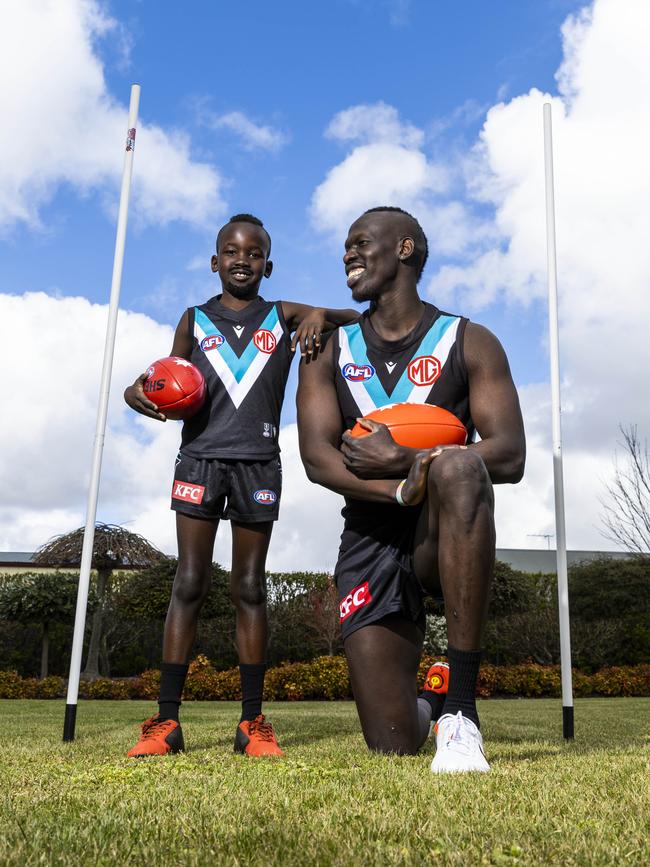
Aliir was born in Kakuma in 1994, one of 12. The civil war in Sudan forced Aliir’s family and eventually more than two million others out of the country as refugees. There was more tragedy for the family, when Aliir’s father died in a car accident in Kenya. Aliir was only seven.
His first memory of Australia was the tall buildings of Sydney. “It was different to anything I had seen,’’ he says. The colour scheme was a little different as well.
“There were so many white people,” he says. There had only been a couple of white faces in the refugee camp. “To sort of flip the switch and there were so many. I was just trying to take everything in.”
The family remained in Sydney for a few months before heading north to Newcastle for three years then even further north to Brisbane.
Aliir remembers the difficulties of fitting into a new world. He arrived speaking no English. Dinka was his first language, while he can also get by in Arabic.
“You get to school and don’t really know how to communicate or know how to do things and you get home and it’s like ‘Jesus, this is going to be tough’,” he says.
But while he went to school to learn a new language, and advanced his skills by watching Australian television, he also discovered another way to fit in.
“Just playing sport got me comfortable with school and made me want to go back the next day,” he says. “I didn’t know English. I didn’t know anything. And what helped me connect with the Australian kids was sport.”
“A kid will look at me and say ‘let’s go have a kick of a soccer ball’. And that goes a long way because you feel like you’re connected. You might not be saying anything, but you’re connecting. I felt like I had been included and it just kind of made me feel more welcome and more happy.”
Aliir took up all the sports he could find. He would play basketball, soccer, rugby league. His leap into footy came when some mates invited him for a kick at the Aspley Hornets, a club not far from his home in Brisbane.
He hadn’t been a big fan of the game, but thought he’d give it a crack.
He made quick progress. He was selected in a Queensland under-16 team and for a world under-16 team made up of kids from multicultural backgrounds.
Aliir missed out on the 2012 draft and the family moved to Perth. But he did well enough, playing for the WA under-18 team, so that the following year he was picked up by Sydney as pick number 44 in the 2013 draft.
Back then he was a trailblazer for young African footballers. North Melbourne had secured another Sudanese refugee in Majak Daw in the 2009 rookie draft but Aliir was the first African to be picked in the main draft.
“I said ‘if he can get it why can’t I do it?’’’
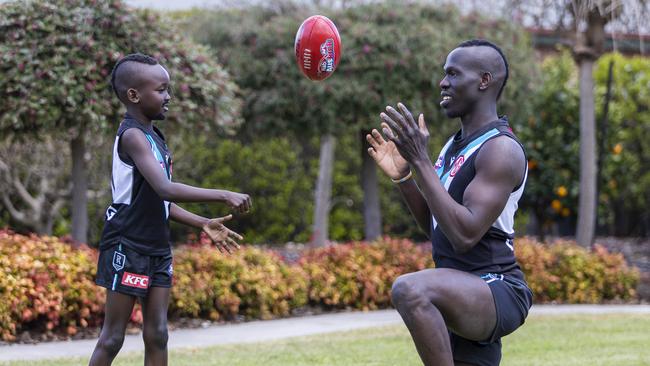
Now there are many more, recruiters no doubt influenced by the success of Aliir. Names such as Changkuoth Jiath, Mabior Chol, Buku Khamis, Leek Aleer now adorn the game.
Aliir is grateful the path to the top is being made easier for players from multicultural backgrounds. When he was coming through, he says, if you didn’t make an under-age state team that was the end of the dream.
Now the AFL has a range of multicultural programs and sees new migrants as a valuable talent source and a way to grow the game.
From his own experience, Aliir understands how sport can be of great importance in helping new arrivals settle in a new community but also give them a purpose.
“As the kid coming to a new country and a new culture you just want to feel welcome. You want to feel like you’re included in a lot of things,” he says.
And sport can be that catalyst.
Aliir says the world of Australian Rules should become used to seeing a lot more African faces running around places such as the SCG and Adelaide Oval.
“I feel like the next few years there’s going to be a lot more multicultural, particularly Africans that are playing,” he says. “And I think the more that they see us doing well at the top level, I guess the more the recruiters can sort of look at it and be like, ‘geez, these guys are built for this game’ and want to try to get them into the AFL system.”
Aliir is keen to return to Africa for a visit. He returned in 2016 but a planned trip at the end of the 2020 season was curtailed by Covid. He has three brothers living in South Sudan and a range of relatives there as well as in Kenya.
“I want to be able to go back because I still have aunties and uncles and cousins that I haven’t seen in a long time,’’ he says. “Especially the ones that haven’t seen me since I was seven years old, so it’s a long time ago, and I’m looking forward to the day I’ll go back.”
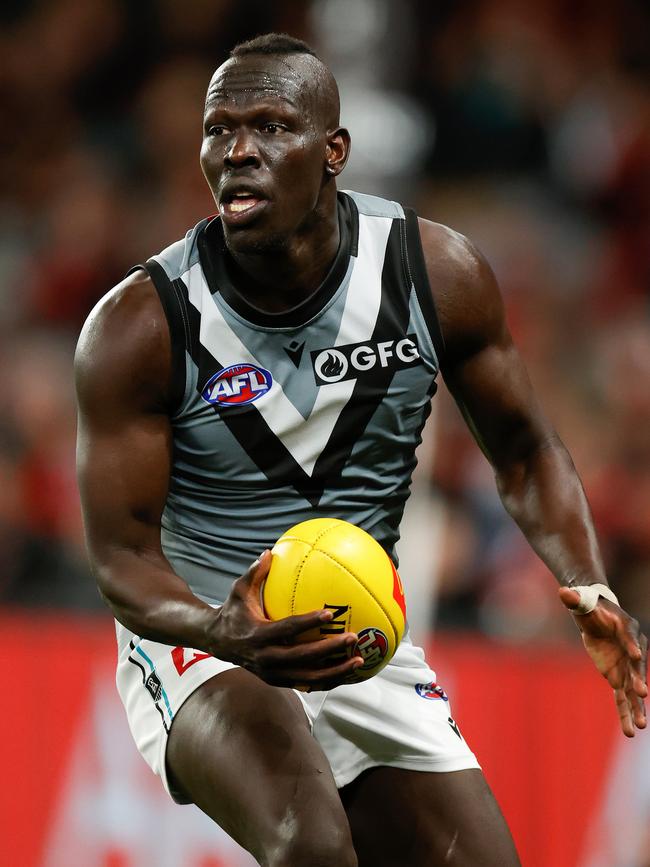
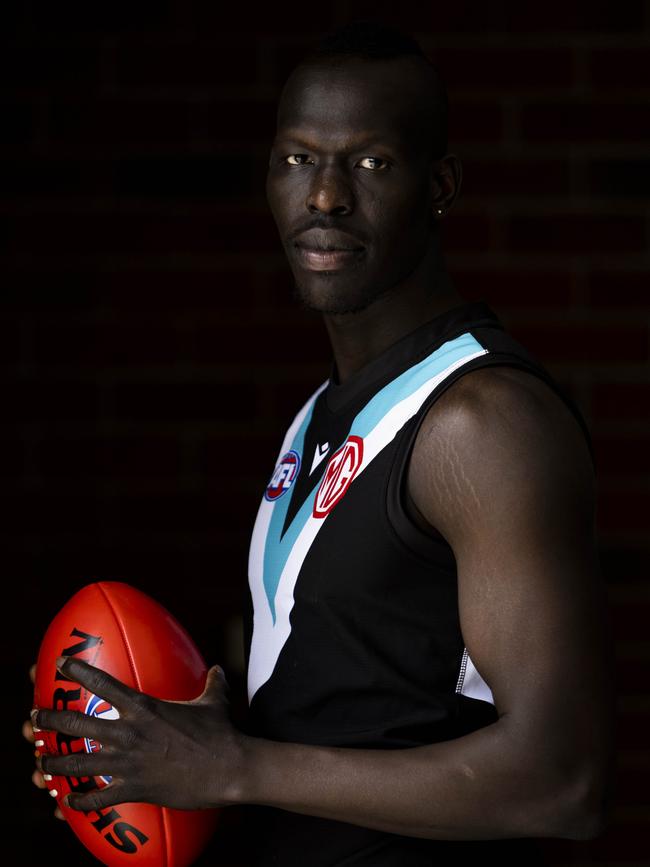
Right now, with Port Adelaide missing out on the finals, Aliir is enjoying some family time.
The let-down of what was a disappointing season for Port still burns when he watches those still playing.
“Sometimes you’re like, you know, we beat that team, we should be there,’’ he says. “And then you start like playing a game in your head.’’
But he has a few old mates from his Sydney days still playing and he may watch the grand final.
He’s also heading to Perth to catch up with his mum Zainab and the rest of the family before coming back to Adelaide to start what will be his 10th season in the AFL system.
He can hardly believe his own longevity.
“I never pictured myself to be going into my 10th year in the actual system. ‘’ he says.
“Now I’m just trying for onfield success and then also trying to be a platform to help other multicultural kids. I’m enjoying the roles that I’m doing. It’s various and it motivates me and keeps me going.’’




